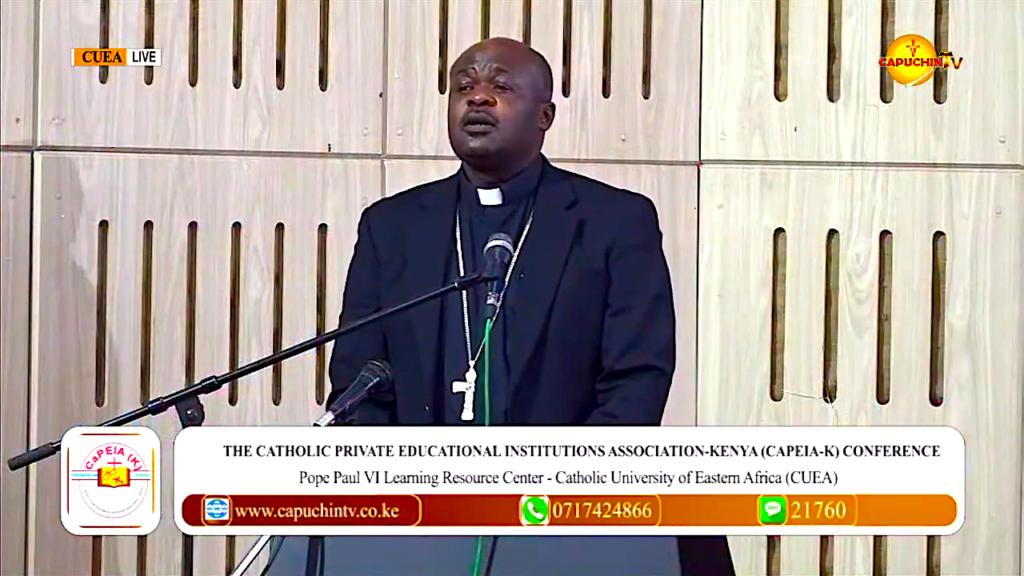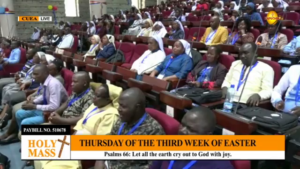KENYA: Catholic Educators Encouraged to Foster Moral and Spiritual Growth to Generation Alpha

Bishop Oseso of Nakuru Diocese
Sr. Jecinter Antoinette Okoth, FSSA
Generation Alpha who are those born between 2010 and 2025, is a generation that needs more protection, formation, and direction because of the complex content and volume of information at their disposal due to technological advancement, Church leader has said.
Addressing hundreds of participants during the 10th edition of the Catholic Private Education Institutions Association (CaPEIA) Conference at the Catholic University of Eastern Africa (CUEA), Bishop Cleophas Oseso Tuka of Nakuru Diocese also reminded teachers of their role and how to act in the digital world to enhance the formation of this generation.
According to Bishop Oseso the recently appointed Chairperson for the Ad-hoc Commission for Aids and Relief and the health department at the Kenya Conference of Catholic Bishops (KCCB), it is predicted that the population of this digitally savvy generation is 2.2 billion, and by 2030, they will constitute about 11% of the workforce.
The Prelate shared some of the moral responsibilities for Catholic educators toward Generation Alpha asking them to engage both the positive and negative aspects of the internet for the generation to learn and grow up morally and Spiritually.
Talking about the risks of internet exposure among youth, the Prelate acknowledged that the internet has transformed people’s lives, work, and relationships. “But unchecked, it is harmful and dangerous.”
“Media brings opportunities to expand children’s perspectives and add more access to information, but, on the other hand, the Internet has also raised new ethical questions and challenges that we must grapple with,” Bishop Oseso said and continued, “Not everything on the internet is safe and good for the learners.”
He notes that the purpose of technology, including the Internet, “Is to enhance human good, and any technological development that detracts from this should be critically examined.”
Bishop Oseso highlighted moral and ethical concerns that internet use exposes to learners and intertwined with scripture messages saying, “Learners are exposed to plagiarism which is more than just “copying and pasting,” but an act of literary theft.” He warned, “Exodus 20:15 reminds us, “Thou shalt not steal and with technology, it is easier for teens to plagiarize school assignments and cheat on tests.”
The internet provides inappropriate content to learners which can range from explicit material to hate speech, and poses a threat to the youth the Bishop disclosed, and explained, “1 John 2:15-16, warns us not to love the world of Satan’s creation, ‘For everything in the world, the lust of the flesh, the lust of the eyes, and the pride of life, comes not from the Father but from the world.”
By providing inappropriate content “the Internet has made things like gambling, pornography, and illegal drugs easily accessible. The younger generation is today exposed to material they are not developmentally ready for,” he disclosed.
Other areas of concern the Local Ordinary of Nakuru called upon the Catholic educators to look into which can lead to the destruction of learners include anonymity, sexual solicitation, violent video games to virtual sex games, gadget lust, internet addiction, fake news and misinformation and identity theft among others.
He therefore urged teachers to be role models and agents of moral formation saying, “Teachers are the biggest resource for students. Their role goes beyond teaching for they are engaged in other functions such as counselling, mentoring, coaching, and motivating.” Besides, “catholic teachers prepare students to fulfill God’s calling in this world and attain the eternal kingdom for which they were created.”
In conclusion, Bishop Oseso urged the teachers who were drawn from various counties within the country to fulfill the purpose of Catholic education of transmitting culture in the light of faith by “forming the human person by developing each student’s physical, moral, spiritual, and intellectual gifts, teaching responsibility and the right use of freedom, preparing students to fulfill God’s calling in this world, and attaining the eternal kingdom for which they were created.”


